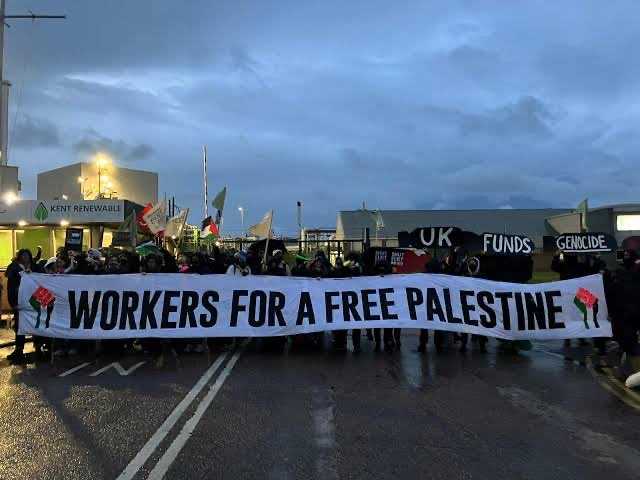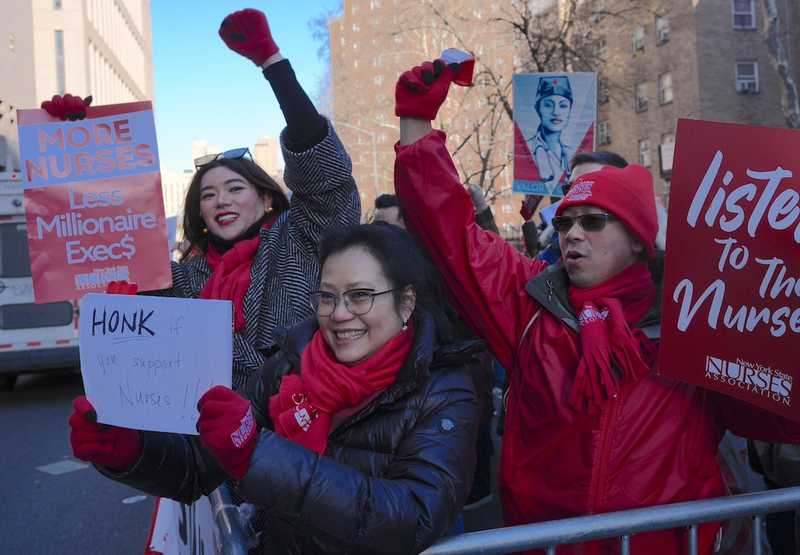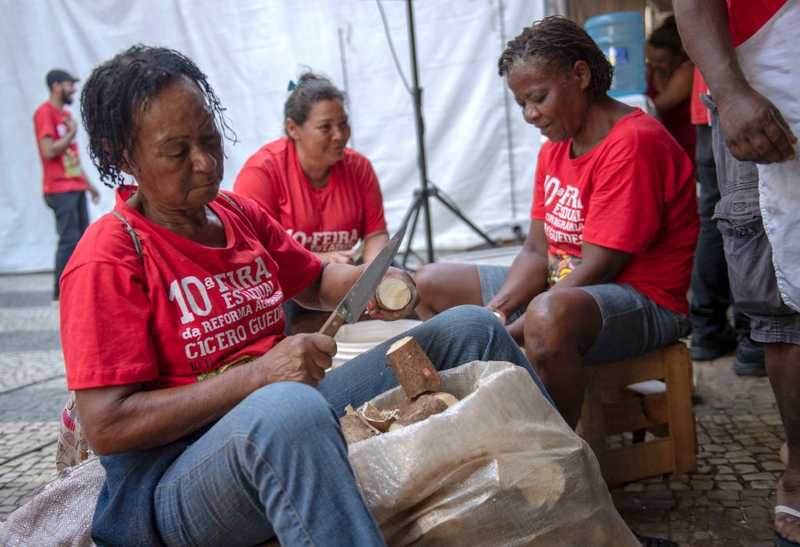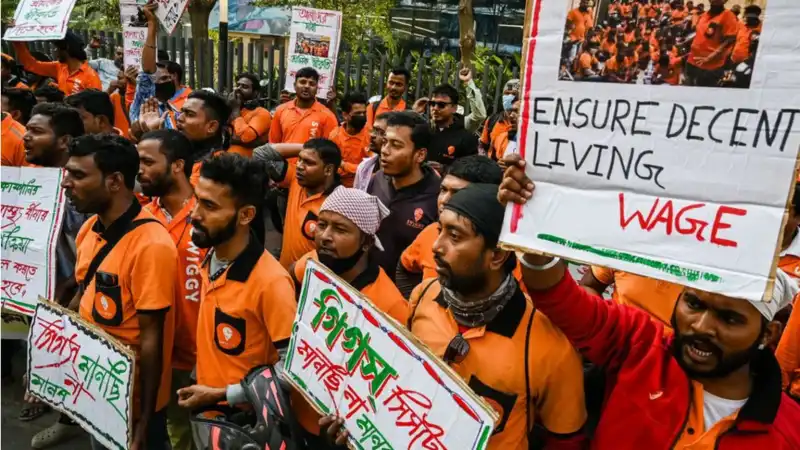
The conversation has been edited for length and clarity.
Tanya Singh: Hi Rafeef, thank you for joining us today.
Rafeef Ziadah: Thank you for inviting me.
TS: Rafeef, I wanted to begin our discussion with the question that has been on my mind since General Federation of Trade Unions called to strike for Palestine on MayDay: In what ways can trade unions ensure that their solidarity efforts with Palestine are intersectional, recognising and addressing the interconnectedness of struggles against racism, imperialism and capitalism?
RZ: I believe trade unions can ensure that by recognising that Palestine is central to anti-colonial, anti-racist and anti-imperialist struggles worldwide.
In the face of unimaginable calculated cruelty unleashed by Israel and its sponsors, even Palestinians, who have endured decades of Israel’s colonial violence, find the current moment inconceivable. This brutality by Israel was unleashed and cheered by the governments of the U.S., the U.K. and the European Union. These states have consistently given Israel diplomatic cover and military aid to continue its settler colonial project. Therefore, rather than an isolated moment or “escalation,” this violence is the culmination of Israel’s settler colonialism, which has long been predicated on the dispossession and erasure of the Palestinian people.
Palestinian trade unions issued a call on October 16 2023 to “Stop Arming Israel.” This call was driven by the substantial military trade and diplomatic backing provided to Israel, particularly by the U.S. and the European Union. Notably, the current U.S. trade agreement alone, valid from 2019 to 2028, is worth $3.8 billion per year, with an additional $14.5 billion in military aid approved since the start of Israel’s current attack on Gaza. Germany finalised 218 export licences to Israel in 2023, with 85 per cent issued after October 7. These examples underscore the complicity of various governments in supporting Israel's genocide.
Through campaigns such as “Stop Arming Israel”, advocacy against militarism aims to stop the arms trade with Israel and prioritises just economies over those based on destruction. Through worker-to-worker solidarity, trade unions can challenge the reliance on industries perpetuating violence and oppression, envisioning economies rooted in justice and mutual cooperation.
In response to this urgent appeal, workers worldwide have taken direct action to disrupt the production and distribution of arms destined for Israel. From dockworkers in Italy blockading cargo movement onto Israeli-operated ships to Indigenous activists and union organisers in Canada shutting down arms factories, these actions demonstrate the potential of workers' solidarity in combating Israeli oppression of Palestinians. Similarly, union federations in India have opposed talks to send construction workers to Israel to replace Palestinians, emphasising the dehumanisation and commodification of workers involved.
In the U.S., grassroots initiatives within unions like the United Auto Workers (UAW) have advocated for a ceasefire and rallied support for the Palestinian Trade Union's appeal for Boycott, Divestment, and Sanctions (BDS). These actions highlight the transformative potential of worker-led solidarity efforts, which reject reliance on governmental authorities and bureaucratic structures in favour of grassroots organising.
Building enduring solidarity within unions requires strategic engagement and commitment to educating members about the Palestinian struggle. While motions within unions play a crucial role in catalysing worker-to-worker solidarity, they must go beyond symbolic gestures to empower workers to take tangible actions, such as refraining from handling Israeli goods.
Workers in Palestine has also developed online resources, including guidance sheets and model motions, to engage trade unionists and support newcomers organising within their unions. By providing actionable guidance and identifying key locations for advocacy efforts, these resources empower workers to challenge the arms trade and stand in solidarity with Palestinian workers.
TS: Well said. And I believe it’s all more essential today for trade unions to be internationalist in their solidarity, as it can be one of the most effective ways to build momentum for a free Palestine, and even influence other movements and policy stakeholders.
RZ: Absolutely, international solidarity among trade unions is paramount in the struggle for a free Palestine. We’ve drawn inspiration from historical movements like union solidarity against apartheid in South Africa and workers’ movements against injustice in Ethiopia and Chile. So, learning from these successful movements only strengthens our collective efforts to support Palestinian workers.
TS: In our deeply divided world today, it is possible that trade unions might face potential resistance from within their ranks when advocating for solidarity with Palestine. Are there any ways to mitigate this challenge today?
RZ: Indeed, resistance to Palestine solidarity efforts, as well as solidarity in general, within trade unions is not uncommon. Years of attacks on trade unions and the promotion of service unionism have sometimes constrained unions' capacity for international solidarity, narrowing their focus to what are often termed “bread and butter issues”. While unions do protect jobs, their role can extend far beyond that to transforming societies and economies. Solidarity isn't an external element of trade unionism but a fundamental aspect that contributes to building the union itself.
To counter resistance against solidarity with Palestine within trade union ranks, it's essential to adopt a thoughtful and strategic approach to political education and action within trade unions. Creating spaces that allow individuals, particularly newcomers to the Palestinian struggle, to ask questions and get involved. By nurturing political education and providing support to new activists, rank-and-file organisers can ensure the endurance of their solidarity efforts in the long term.
Workers in Palestine has published a guide outlining strategies on how to approach trade unionists in the arms industry and engage them in meaningful dialogue. This guide emphasises the importance of understanding union issues and building lasting relationships. By providing practical tools and resources, such as methods for building solidarity networks within trade unions, we aim to support activists in navigating the complexities of trade union engagement effectively.
TS: Do you have a message for our readers who want to contribute to this call for a strike and support Palestine?
RZ: You don't have to be a member of a trade union to support the Palestinian cause this MayDay. While trade union density varies across sectors and regions, everyone can play a part in raising support for Palestine and contributing to the movement for justice and liberation.
Taking part in strikes and protests stands as a powerful form of solidarity, echoing past workers' movements against apartheid and militarism. Workers in Palestine has published useful guidance sheets and model motions that can help you to start organising within your workplace and mobilise others within their communities.
Addressing the arms trade, you can utilise the "Who Arms Israel?" toolkit to learn about and organise against companies like Lockheed Martin and Boeing, which provide crucial support to the Israeli military, thereby disrupting the flow of resources sustaining Israel’s genocide in Gaza. Taking direct action guided by resources like the "Stop Arming Israel Guide," whether through boycotting complicit companies or organising divestment campaigns, empowers individuals to make tangible contributions.
Engaging in long-term efforts to mobilise fellow workers union members in solidarity actions, such as attending marches or holding educational events with local Palestine solidarity organisations, also fosters collective action and awareness within the labour movement. It’s important to investigate direct links between your workplace and Israel, such as through arms trade connections or pension portfolio investments. This provides insight for developing targeted campaigns. Additionally, from MayDay to Nakba Day this year, it would also be helpful to use all social media platforms to share the Palestinian General Federation of Trade Unions Gaza Call to Action and resources.





